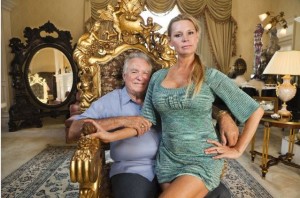
David Siegel and Jaqueline Siegel
Photo by Lauren Greenfield – © 2012 – Magnolia Pictures
Lauren Greenfield’s The Queen of Versailles challenges viewers to contemplate the emptiness and excess created by consumerism. Through following one ultra-wealthy family’s accumulation and subsequent loss of material wealth, Greenfield explores America’s pre-Recession moral decay and its consequent (and painful) hangover. Part cinema verite, part candid interview, she investigates the ugly byproduct of America’s free market ideology – unashamed greed – and how we are all suspect to its charm.
“Everyone wants to be rich,” says David Seigel, one of the subject of Greenfield’s film, as he expounds on his business philosophy, “if they can’t be rich, the next best thing is to feel rich. And if they don’t want to feel rich, they’re probably dead.” Seigel, the owner and founder of the largest privately-owned timeshare company, uses this theory to amass his empire. While he profits from alluring working-class Americans to indulge their appetite for luxury, he seeks his own aspirations of building the largest house in America, modeled after the Versailles Palace. In essence, Seigel’s business successes and personal aspirations epitomize America’s pre-Recession greed-driven culture.
But when the housing market crashes, his billions disappear. While Greenfield could have focused on David for her film, as his meteoric rise and fall have Shakespearean proportions, she instead makes Jackie, his wife, the primary subject of the film. Greenfield follows the tall, blonde fortyish shopaholic as she attempts to maintain cohesion within her family of eight children even as they become bankrupt. As the family falls deeper into economic trouble, we see Jackie becoming more responsible. Although she remains quixotically optimistic that their wealth will return and that they will complete their Versailles home, she forces herself to live a more constrained lifestyle.
The Queen of Versailles received high critical praise, including the US directing award at the 2012 Sundance. The film received further attention when David Seigel sued Greenfield for not obtaining proper release. The US District Court Judge Anne Conway sided with the filmmaker, writing “it rips the fibers of the imagination to stretch it so far as to believe that a sophisticated business executive within the tightly run organization of a self-proclaimed dictator would sign an agreement without reading it and without ever discussing it with his iron-fisted boss and father until after litigation commenced.”[i]
But as much as this film is a moral indictment against American consumerism, it is also a celebration of ambition, strength, charity, and redemption. No doubt Greenfield remains sympathetic to her subjects, particularly Jackie, whose unpretentiousness and undying optimism makes for a compelling watch. While the film indulges the audience’s sense of schadenfraude, it also forces the audience to cringe when we see their comeuppance. But the film hits its audience the hardest when it reveals the emptiness in our material lives. This becomes most apparent when the Seigel family opens up their hundreds of Christmas presents. After the brief and fleeting moment of excitement of opening the presents, the family sits with empty expressions on their faces, surrounded by a sea of cheap plastic toys and glittering wrapping paper. As A.O. Scott of the New York Times writes, “if this film is a portrait, it is also a mirror.”[ii]
[i] United States District Court Middle District of Florida Orlando Division. Westgate Resorts, Ltd. v. Lauren Greenfield, Frank Evers and Greenfield/Evers LLC. 2013-01-24. Retrieved 2013-04-09. http://www.entlawdigest.com/2013/01/29/qofversailles.pdf
[ii] Scott, A. O. “Let Them Eat Crow.” New York Times 20 July 2012. Web. 10 April 2013.
